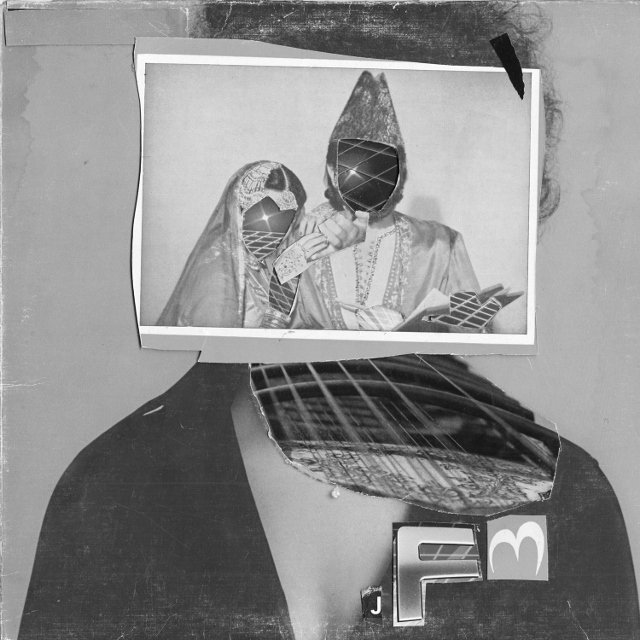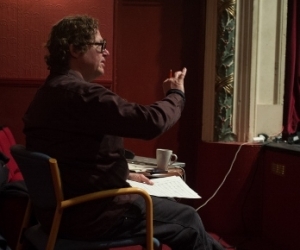
“It depends on what you call the beginning, I guess,” says Darcy Spidle when probed about the origins of his experimental music label, Divorce Records. “The first thing I did with the label— about fifteen years ago—was to make big posters that said ‘Music Sucks,’ and then put the Divorce logo underneath. I pasted them all over town. That was the first act, because that’s how I felt at the time.”
In 1999, Spidle was living in Halifax’s north end, playing in rock bands and living with a coterie of art-school students. In those days, Halifax was experiencing something of a music-industry hangover. The early ’90s saw a number of major American labels and press outlets, in a haste to discover “the next Seattle,” focus their energy and resources on Halifax. For people with even a passing interest in Haligonian music, the story is hard to escape.
For Spidle, the activity that followed the grunge deluge was the reality of his nascent days as a musician. “We were sort of the babies of that scene. Sloan had gotten big; Thrush Hermit was touring the country; that’s what Halifax was known for. There was an industry buzz in Halifax: bands could still sort of make it big. People had videos on MuchMusic—that kinda thing,” recalls Spidle. “The music-industry culture felt kind of weird at the time.”
Spidle played his part in The Holiday Snaps, an indie pop combo that soaked up some of the draining waters: “We had some good moments and some bad moments. We were on a label, and it was really good to us. We were just young, selfish, and immature. It was a little disheartening.” It was this experience that spawned the seeds (and reactionary posters) that would eventually become Divorce Records.
As a reaction to his dissatisfaction with his band’s place within the industry, Spidle and his fellow Snaps formed a kind of doppelganger group, The Dead Roads—“a very degenerate project with only nihilistic aims,” he says. That band released the first entry in the Divorce catalogue, a short-run cassette called Murder In The Trees (D01).
In the fifteen years that have followed, Divorce has steadily grown into an internationally recognized source for experimental Canadian music of all sorts. With a humble set of forty-odd releases, Divorce’s catalogue encompasses post-hardcore, art-damaged punk, lo-fi pop rock, power electronics, outré jazz, and much, much more.
Beginning with a stable of local bands, mostly close friends of Spidle, Divorce gained national traction with more widely distributed releases by seminal Halifax groups like Be Bad, Dog Day, and Husband & Knife. Spidle recalls: “Around 2007, a band from Vancouver, Shearing Pinx, got in touch with me. And that was the beginning of making records for people that I’d never even met. It all blossomed from there.”
This blossoming was due not only to the quality and bravado of Divorce’s catalogue, but also to the attentive physicality of its objects. “I've always felt that a record deserves a lot of time and care. Nothing we’ve done is haphazard. Divorce has put out some of the most experimental and challenging records in Canada in the last decade. That’s always been a little risky, but I felt like the music deserved that kind of treatment.”
Essentially a one-man venture, Divorce is incredibly exacting for all parties concerned. Though the payoff, for Spidle, is huge. He cites as personal highlights working with legendary jazz drummer Jerry Granelli on the seventy-three-year-old’s first solo record, 1313 (D35), and helping launch careers for relatively unknown acts like London, Ontario dream-poppers You’ll Never Get To Heaven (D39).
Beyond hard work and dedication, Divorce benefits from Spidle’s keen curatorial sensibilities. Over the years, he has built an incredible amount of trust with artists and listeners alike, and turned that faith and his curatorial know-how toward a bigger project: OBEY Convention.
Held annually in Halifax for the past seven years, OBEY is one of Canada’s most exciting and well-respected fringe music festivals. OBEY has hosted such international luminaries as Chris Corsano, Bill Orcutt, Pissed Jeans, Eric Copeland, and Julianna Barwick, as well as showcasing emerging Canadian talent like Tim Hecker, Mac Demarco, Kyle Bobby Dunn, and Aiden Baker. On any given bill, festival-goers can expect the unexpected: little local acts paired with big names, Hindustani ensembles opening for ambient players, psych bands on the steps of the public library; and with a focus on free, all-ages programming, the bent of OBEY is decidedly educational.
Explains Spidle: “I like realizing my own vision—seeing things, connecting them together, and helping others, who might not see the connection, realize it when it’s presented to them in the right way.” This considered curation has created space and support in Halifax for OBEY, and garnered worldwide praise for Divorce, which has also started another new venture, releasing a series of contemporary classical cassettes under its new imprint Heavy Fog.
“How I piece things together is my art form,” says Spidle. “All these bands are like colours on a palette. It takes the creative part of my brain to make something coherent, that’s also both original and compelling. I go into a pretty deep headspace when I’m working on that kind of stuff.”
NOTE: Darcy Spidle writes about his new creative paths, the fate of Divorce Records and Heavy Fog, and more in a December 2014 post on the Divorce Records website. Read it here.
Image: Cover artwork for the Divorce Records release JFM by JFM, the solo electronics project of Toronto sound and visual artist Jesse Matthews.


